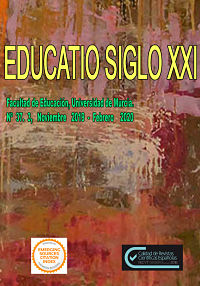The challenge of oral expression in Primary Education: characteristics, difficulties and ways for improving
Abstract
There have been numerous studies on communicative competence and the teaching of oral expression and interaction in the classroom. The linguistic skills inherent in oral expression are the most difficult to achieve in the learning of both the mother tongue and foreign languages. Therefore, it needs special attention and careful planning. The aim of the present work is to make a critical reflection upon the theoretical basis that differentiate the oral modality from the written modality and the difficulties that arise in teaching oral expression in the primary education classroom. In order to achieve this, we have looked at a series of theoretical bases for the development of oral expression, paying particular attention to the methodological difficulties of this skill, such as the complexity of its assessment, among other aspects. Similarly, we have defined a series of objectives for each educational stage, including pragmatic aspects. Activities and didactic procedures are described in order to highlight different strategies for the development of communicative competence, considering it to be one of the fundamental objectives of language learning.
Downloads
-
Abstract23441
-
PDF (Español (España))24090
References
Agustín, M.ª P. (2007). La importancia de la lengua oral en la clase ELE, estudio preliminar de las creencias de los aprendices. En E. Balmaseda (coord.), Las destrezas orales en la enseñanza del español L2-LE. XVII Congreso Internacional de la Asociación del Español como lengua extranjera (ASELE). Logroño: Universidad de la Rioja, V (1), 167-174. Disponible en: https://dialnet.unirioja.es/servlet/libro?codigo=274366
Aller, M. (1996). Hablar. La expresión oral en el aula. Madrid: Santillana.
Bordón, T. (2008). La evaluación de la expresión oral y de la comprensión auditiva. En J. Sánchez Lobato e I. Santos Gargallo (eds.), Vademécum para la formación de profesores. Enseñar el español como segunda lengua (L2)/lengua extranjera (LE) (pp. 98-1001). Madrid: SGEL.
Briz, E. (1998). La evaluación en el área de lengua y literatura. En A. Mendoza (coord.). Conceptos clave en didáctica de lengua y la literatura (pp. 115.140). Barcelona: SEDLL, ICE Universitat de Barcelona.
Calsamiglia, H., Tusón, A. (1999). El discurso oral. En H. Calsamiglia y A. Tusón. Las cosas del decir. Manual de análisis del discurso. Barcelona: Ariel
Cantero, F. (1998). Conceptos claves en lengua oral. En A. Mendoza (coord.), Conceptos claves en didáctica de lengua y la literatura. Barcelona: Horsori.
Cassany, D., Luna, M. y Sanz, G. (1994). Enseñar lengua. Barcelona: Graó.
Consejo de Europa (2002). Marco común europeo de referencia para las lenguas: aprendizaje, enseñanza, evaluación. Madrid: Ministerio de Educación, Cultura y Deporte. Disponible en: http://cvc.cervantes.es/ensenanza/biblioteca_ele/marco/cvc_mer.pdf
De Luca, M. (1983). Didáctica de la lengua oral. Metodología de enseñanza y evaluación. Buenos Aires: Kapelusz.
Domínguez, P. (2008). Destrezas productivas en la enseñanza del español como lengua extranjera. En Suplementos Marco ELE, 6. Disponible en: http://marcoele.com/num/6/pdominguezdestrezas/02e3c09a810cb6309/pdominguez_destrezas.pdf
Domínguez, P. (2008). Destrezas productivas en la enseñanza del español como lengua extranjera. En Suplementos Marco ELE, 6. Disponible en: http://marcoele.com/num/6/pdominguezdestrezas/02e3c09a810cb6309/pdominguez_destrezas.pdf
Instituto Cervantes (1997-2016). Diccionario de términos clave de ELE. Disponible en: http://cvc.cervantes.es/ensenanza/biblioteca_ele/diccio_ele/default.htm
Instituto Cervantes (2006). Plan Curricular del Instituto Cervantes. Madrid: Biblioteca Nueva.
Littlewood, W. (1994). La enseñanza de la comunicación oral. Barcelona: Paidós.
Lynch, T. (1996). Communication in the language classroom. Oxfort: Oxford University Press.
Martín Vegas, R. A. (2009). Manual de Didáctica de la Lengua y la Literatura. Madrid: Síntesis.
Níkleva, D. G. (2008). La oposición oral/escrito: consideraciones terminológicas, históricas y pedagógicas. En Didáctica. Lengua y Literatura, 20, (pp. 211-227). Madrid: Publicaciones Universidad Complutense de Madrid.
Pinilla, R. (2008). La expresión oral. En J. Sánchez Lobato e I. Santos Gargallo (eds.), Vademécum para la formación de profesores. Enseñar el español como segunda lengua (L2)/lengua extranjera (LE) (pp. 879-897). Madrid: SGEL.
Quiles, M.ª C. (2006). La comunicación oral. Barcelona: Octaedro.
Vilà, M., Castellá, J. M. (2014). Enseñar la competencia oral en clase. Barcelona: Graó.
Zuccherini, R. (1992). Como educar la comunicación oral. Barcelona: Grupo editorial CEAC.
Original work publishes in this journal is subject to the following terms:
1. Murcia University Press (the publishing house) holds the copyright of the publishes work, and favours and allows their reutilization under the use license stated in point 2.
© Servicio de Publicaciones, Universidad de Murcia, 2015
2. Work is published in the electronic edition under a license (Creative Commons Reconocimiento-NoComercial-SinObraDerivada 4.0 España (legal text). They can be copied, used, disseminated, transmitted and publicly presented, as long as: i) authorship and original publication source is acknowledged (journal, publishing house and URL of the work); ii) are not used for commercial purposes; iii) the existence and specifications of this use license is stated.
3. Conditions for self-archive. Authors are allowed and encouraged to disseminate electronically the pre-pint (before review) and/or post-print (accepted for publication) versions of their work before their publication since that favours earlier circulation and dissemination resulting in an increased chance for the authors to be cited and for the work to reach a bigger share of the academic community. Colour: RoMEO: green.







